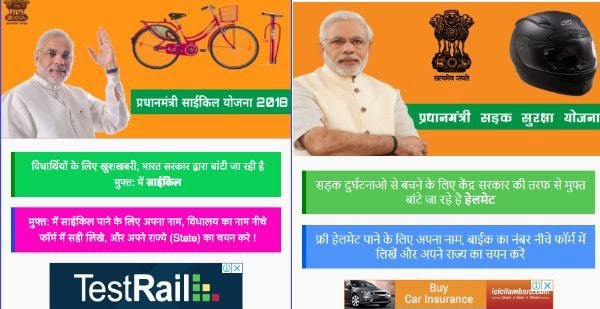
This is one of the latest rumours doing rounds on Whatsapp via the facade of a government website. It claims that the Indian government has launched a scheme to give away free cycles to youngsters. Accessing the “bharat-sarkar.co” link attached to the message opens up a form that mentions the details of the purported government initiative. It says (translated) – “To get cycles for free, fill the form below with your name, your school’s name and the state you’re from.” It goes on the add that “all cycles will be distributed on 15 August 2018 at your nearest government school.” The website asks for personal details, including father’s name and residential address.
Similar interface, several scam websites
The same “free bicycle” advertisement is also propagated on another website of the same name but different domain – “bharat-sarkar.com”
Alt News found two other websites staging the similar interface but a different government scheme. Websites “pm-yojna.in” and “helmet.pm-yojna.in” claim that the central government is giving away free helmets under its “Pradhan Mantri Sadak Surasha Yojana”. Both websites include the Prime Minister’s photograph and forms similar to the “free bicycle” scheme. To enter the initiative the websites ask for your name, bike registration number and state.
The web design of these sites is optimised for mobile phone users. Furthermore, an image of the Prime Minister and the state emblem of India are added to make the website look credible and the possibility of getting something for “free”, takes away users’ hesitance. Those who have been newly introduced to the virtual world and are smitten by the internet, might not delve into its perils.

The messages of these fake government schemes are also circulating on social media.

Not government websites
There are various clues that call these websites’ bluff, some more glaring than the rest. Below is the analysis of “bharat-sarkar.co”, however, all other websites echo these same characteristics.
1. “Terms and conditions”
If one were to scroll down the form, a “terms and conditions” link is visible at the bottom and this alone is enough to bust the scam. Clicking on this link redirects to a page that clearly mentions “this site is not associated with Indian government or any political party” and “bicycle distribution depends on us”.

2. All government websites either end with “gov.in” or “nic.in”
The makers of the aforementioned website attempted to make it resemble a government portal, which also explains the name “bharat-sarkar”. However, its URL ends with a “.co” while websites of the Indian government either end with a “gov.in” or “nic.in”.
The official website of any ministry or government department always ends with the domain “gov.in”. For example – Ministry of External Affairs (mea.gov.in), Government of Uttarakhand(uk.gov.in), Swachh Bharat (swachhbharatmission.gov.in), Prasar Bharati(prasarbharati.gov.in).
The website of any organisation affiliated to the Indian government ends with a “nic.in”. Domain name ‘nic.in’ is owned by the National Informatics Centre (NIC), which is the science and technology organisation of the Government of India under the Ministry of Electronics and Information Technology. ‘Nic.in’ can be allocated only to Indian government entities. For instance, Central Board of Secondary Education (cbse.nic.in), Indian Institute of Mass Communication (iimc.nic.in).
 3. IP address located in Singapore
3. IP address located in Singapore
Alt News first searched the IP address of “bharat-sarkar.co”.

We then located the website’s region of origin and found that it was registered in Singapore, under GoDaddy.com. An Indian government website cannot be registered abroad and is always registered under National Informatics Centre (NIC). The website details of MEA in the image below affirms the same.

Online money-making scam?
Google AdSense is an easy method to make quick bucks and one cannot help but notice the ads placed through the length of the forms on all the four websites. The reason for the makers of these shady websites to popularise fake advertisements via Whatsapp is to redirect as many people as possible to their portals. If the traction is high, a number of individuals would click on the Google ads thus, giving the sites more money on cost-per-clicks.

Alt News had, in an earlier article, reported how such websites are created to make money off of deceiving people and collecting their personal data. Last year, a Whatsapp forward claimed that PM Modi is giving free balance. This too redirected users to a form that asked for their name, phone number, mobile service operator and the state of residence. Alt News found how the person behind this scam was operating a host of other such websites to make money.
Such instances are commonplace on the internet, and Whatsapp is one of the quickest ways to garner an audience. Recently, another fake message was viral on Whatsapp, calling Hindus to vote for Ram Mandir against Babri Masjid. It provided a link at the end that redirected people to a voting form. The one-page form also adorned two Google ads.
The internet is infested with shady websites and pages/groups on social media that post content of “mass appeal”. We have observed in the past as well, instances of publishing provocative content – political, communal or sleazy – to amass countless clicks on a page. However, when such websites resort to faking government schemes and blatantly use the Prime Minister’s photograph for the same, the issue deserves greater attention and the need for law enforcement agencies to pay heed.
(The article was first published on altnews.in , researched and written by Pooja Chaudhuri)

